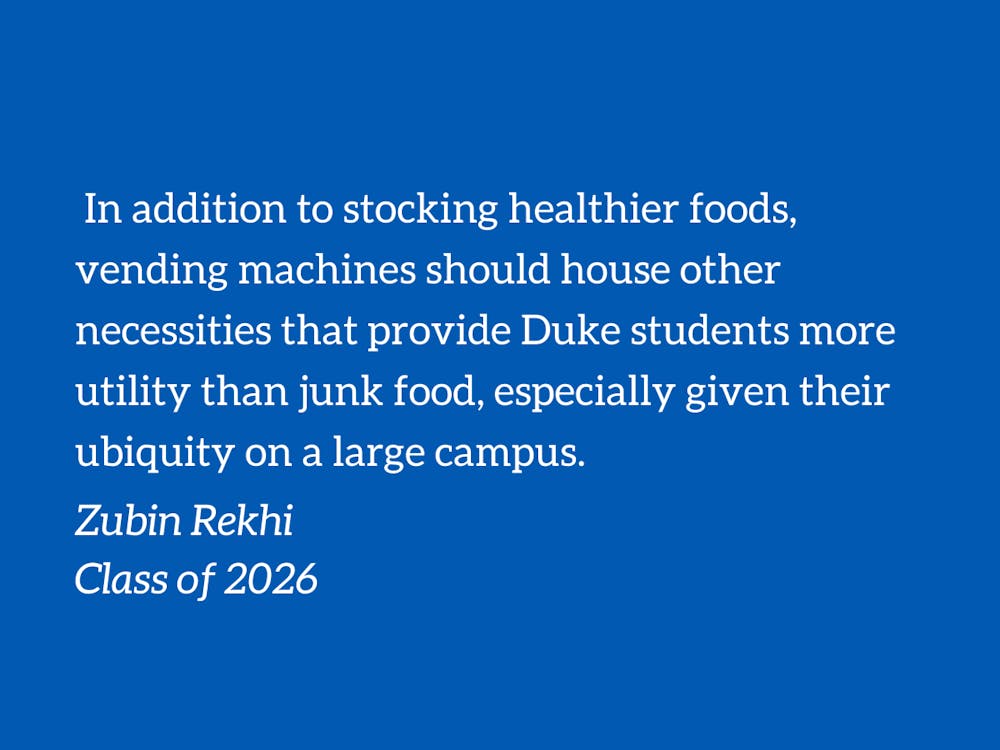If, like me, you study late into the night as midterm season approaches, you probably also enjoy taking late-night snack breaks through vending machines. While sipping on Diet Coke and snacking on Doritos from a vending machine in Perkins last week, I had a late-night realization: what if I wanted healthier food at 12:30 AM? And why was it that vending machines, which are ubiquitous on campus, could not house things students need more immediately than junk food, including over-the-counter medicines, like Tylenol, and stationary for classes, like extra calculators? It occurred to me that I haven’t looked into how Duke limits the potential uses for vending machines, which form an unparalleled distribution network on campus that’s lying latent.
Vending machines, by definition, house non-perishable, processed food whose lifespans can last long enough that their contents don’t go stale by the time we consume them. But not all non-perishable foods are as unhealthy as Lays chips — there are some that house Kind bars, trail mix, Cliff Bars and stick to non-sugary beverages. Others, like the ones from which I usually procure late-night snacks, stick to high-caloric foods. Considering the dearth of other food options on campus after 10 PM — which are essentially limited to Pitchforks, McDonald’s, or vending machines — the contents of vending machines should be more rigorously scrutinized through the lens of nutritional value. College students have notoriously off-kilter sleep times, particularly at Duke; considering that, it would be nice if instead of eating greasy McDonald’s fries or potato chips, we could also eat more raisins or trail mix late at night.
In addition to stocking healthier foods, vending machines should house other necessities that provide Duke students more utility than junk food, especially given their ubiquity on a large campus. Our campus is large and cumbersome to traverse. A 10-minute long shuttle ride separates one half of the student body from the other and another 5-10 minute walk separates our dorms, classes, cafeterias, pharmacies and hangout spots from the shuttle. Those of us with cars who go off campus to buy necessities have to trek five to ten minutes to parking spots in Blue Zone and drive to off-campus grocery stores and pharmacies with the uncertainty of knowing whether an empty parking space awaits us when we get back. Everyone would save unneeded time and stress if they had daily necessities closer to where they ate, studied, worked or hung out, stocked conveniently in vending machines.
So in addition to stocking healthier non-perishable foods, vending machines should be stocked with stationary, like G2 pens, small notebooks and Texas Instrument scientific calculators; health products, including over-the-counter medication like Tylenol or allergy medicine, first-aid kits and contraception; and other miscellaneous goods like nail clippers. The products offered in vending machines could be tailored to the building they are in: stationary vending machines could be placed in the library while health products could be housed closer to our dorms. Product mixes could also change with the time of year: during spring allergy season, more health machines can stock allergy medication; during LDOC, more can stock electrolyte and hydration pouches. A re-imagination does not require buying new machines: vending machines often occur in pairs, so we could re-stock one per each duplicative set of machines across campus buildings so that they contain health or stationery products rather than more junk food.
Reimagining vending machines might seem like a tall task that overlooks what can be feasibly implemented but it is, in fact, long overdue and completely achievable. For starters, Duke already does have health and stationary machines, although not enough of them: there’s a stationary vending machine in Bostock library and a few health-focused machines in Bryant Center and on East Campus. It should expand its offerings by modifying the contents of its existing machines. UNC, by contrast, has three health-specific vending machines: one in the Carolina Union, another in the Health Center, and a third in their Gillings School of Public Health. Those machines provide sick students with medicines and the remedies they need after hours and are conveniently located in UNC’s Student Union. Yale also opened a chain of sexual health-focused vending machines. Given the benefits that reimaging vending machines could bring students, I believe it’s high time the administration should consider doing so.
Zubin Rekhi is a Trinity junior. His pieces typically run on alternate Fridays.
Get The Chronicle straight to your inbox
Sign up for our weekly newsletter. Cancel at any time.

